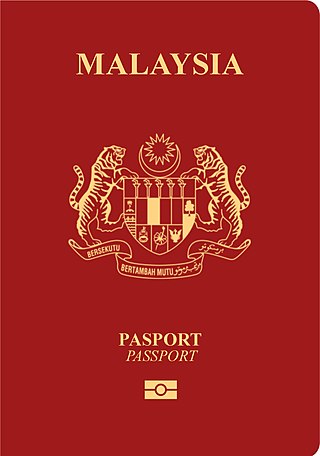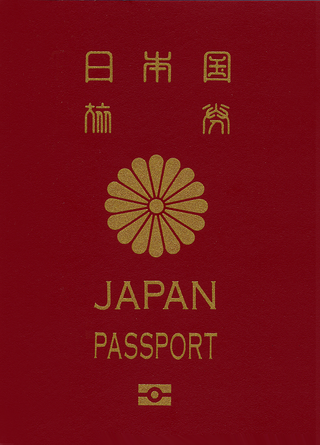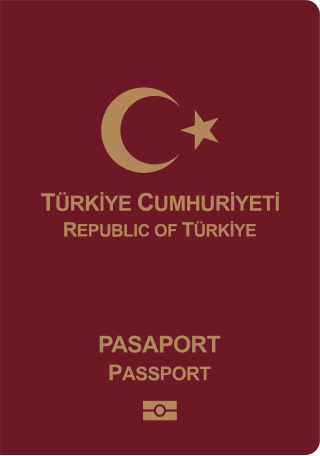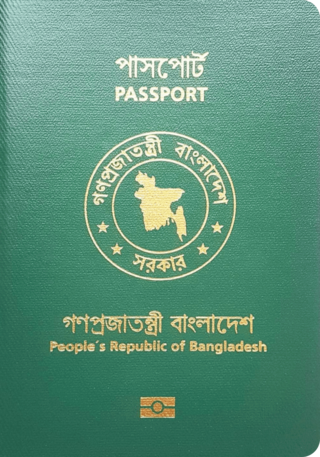
A visa is a conditional authorization granted by a polity to a foreigner that allows them to enter, remain within, or leave its territory. Visas typically include limits on the duration of the foreigner's stay, areas within the country they may enter, the dates they may enter, the number of permitted visits, or if the individual can work in the country in question. Visas are associated with the request for permission to enter a territory and thus are, in most countries, distinct from actual formal permission for an alien to enter and remain in the country. In each instance, a visa is subject to entry permission by an immigration official at the time of actual entry and can be revoked at any time. Visa evidence most commonly takes the form of a sticker endorsed in the applicant's passport or other travel document but may also exist electronically. Some countries no longer issue physical visa evidence, instead recording details only in immigration databases.

A biometric passport is a traditional passport that has an embedded electronic microprocessor chip, which contains biometric information that can be used to authenticate the identity of the passport holder. It uses contactless smart card technology, including a microprocessor chip and antenna embedded in the front or back cover, or centre page, of the passport. The passport's critical information is printed on the data page of the passport, repeated on the machine readable lines and stored in the chip. Public key infrastructure (PKI) is used to authenticate the data stored electronically in the passport chip, supposedly making it expensive and difficult to forge when all security mechanisms are fully and correctly implemented.

The Malaysian passport is the passport issued to citizens of Malaysia by the Immigration Department of Malaysia.

The People's Republic of China Passport is a passport issued to citizens of the People's Republic of China for the purpose of international travel, and entitles its bearer to the protection of China's consular officials overseas.

An Indonesian passport is a travel document issued by the Government of Indonesia to Indonesian citizens residing in Indonesia or overseas. The main governing body with regards to the issuance of such passport(s), possession(s), withdrawal and related matters is the Directorate General of Immigration under the Ministry of Law and Human Rights. Indonesia does not recognize multiple citizenship for its citizens and such citizens will automatically lose their Indonesian citizenship if another citizenship is acquired voluntarily. Special exceptions allow newly born citizens to hold dual nationalities until his/her eighteenth birthday after which a choice of either nationalities should be decided. The latest Indonesian passport has different national birds and sceneries on each page.

Croatian passport is issued to citizens of the Republic of Croatia for the purpose of international travel. The passport has the purpose of serving as proof of Croatian citizenship and identity. Responsibility for their issuance lies with the Ministry of the Interior; and for citizens abroad, passports are issued by the local embassy or consulate. Croatian passports are valid for ten or five years, and are not renewable. Every Croatian citizen is also a citizen of the European Union. The passport, along with the national identity card allows for free rights of movement and residence in any of the states of the European Economic Area and Switzerland.

The Mexican passport is the passport issued to Mexican citizens for the purpose of travelling abroad. The Mexican passport is also an official ID and proof of Mexican citizenship. According to the January 2024 Henley Visa Restrictions Index, holders of a Mexican passport can visit 161 countries without a visa, placing Mexico in the 23rd rank in terms of global travel freedom.

Japanese passports are issued to Japanese nationals to facilitate international travel. From 2018 to 2022, it was ranked first on the Henley Passport Index for visa-free travel, and third as of July 2023, with holders able to travel visa-free to 189 countries and territories.

Turkish passport are issued in accordance with the Passport Act from 15 July 1950 to Turkish citizens to travel abroad. Citizens of the de facto state of the Turkish Republic of Northern Cyprus (TRNC) are also eligible to apply for a Turkish passport.

The Brazilian passport is the official document for foreign travel issued by the federal government, through the Federal Police.

The Albanian passport is a travel document issued by the Ministry of Interior to Albanian citizens to enable them to travel abroad. They are also used as proof of identity within the country, along with the Albanian ID card.

The Syrian passport is a travel document issued by Syria's Department of Immigration and Passports to Syrian citizens for international travel. Syrian passports are normally valid for six years; however, for men about to perform military service, they are valid for two years, and they have to get permission from the conscription department for a renewal for another two years.

The passport of the Republic of Lebanon is a passport issued to the citizens of the Republic of Lebanon to enable them to travel outside the Republic of Lebanon and entitles the bearer to the protection from the diplomatic missions and consulates of the Republic of Lebanon if necessary. It is issued exclusively by the Lebanese Directorate General of General Security (DGGS), and can also be issued at various Lebanese diplomatic missions and/or consulates outside the Republic of Lebanon. It allows the bearer a freedom of living in the Republic of Lebanon without any immigration requirements, participate in the Lebanese political system, entry to and exit from the Republic of Lebanon through any port, travel to and from other countries in accordance with visa requirements, facilitates the process of securing consular assistance abroad from the diplomatic missions and consulates of the Republic of Lebanon if necessary, and requests protection for the bearer while abroad.

The Bangladeshi passport is an ICAO compliant, machine-readable and biometric e-passport issued for the purpose of travel to foreign countries by the passport holder. Bangladesh is the first country in South Asia to issue e-passports for all eligible citizens. The passport booklet is manufactured, printed and issued by the Department of Immigration & Passports of the Ministry of Home Affairs. This electronic microprocessor chip embedded e-passport has forty-one different security features, including holographic images embossed in thin-film laminate, which change colour under light and appear to move. Demographic and biometric information of the e-passport holder are stored on the chip inside the e-passport. This information includes the fingerprints of all ten fingers of the passport holder; the iris scan of both eyes; a color photograph of the face of the bearer; their digital signature; etc. Depending on the age of the applicant, the e-passport is valid for either five years or ten years and it is distributed by the Government of The People's Republic of Bangladesh, or by any of its overseas diplomatic missions, to eligible Bangladeshi nationals who are citizens by birth, by descent or through naturalization.

A Barbados passport is a travel document issued to citizens of Barbados, in accordance with Citizenship Act from 1978, the Immigration Act from 1997, and the Barbados Constitution, for the purpose of facilitating international travel. It allows the bearer to travel to foreign countries in accordance with visa requirements, and facilitates the process of securing assistance from Barbados consular officials abroad, if necessary.

The Rwandan passport is issued to Rwandan citizens for international travel. Rwanda started issuing East African CommunityBiometric Passport also known as E-Passport(With which entry to all east African countries is visa-free) in June 2019 replacing the old ones that will only stay valid until June 2021, The new passports are valid for five years and ten years.

The Grenadian passport is a travel document issued to citizens of Grenada, in accordance with the Grenadian Citizenship Act of 1976 and the Grenada Constitution, for the purpose of facilitating international travel. It allows the bearer to travel to foreign countries and the Commonwealth of Nations, in accordance with visa requirements, and facilitates the process of securing assistance from Grenadian consular officials abroad, if necessary.

The Vanuatu passport is an international travel document issued to Vanuatu citizens.

Sri Lankan passports are issued to citizens of Sri Lanka for the purpose of international travel. The Department of Immigration and Emigration] is responsible for issuing Sri Lankan passports.

The Ugandan passport is a document issued to citizens of Uganda for international travel.





















